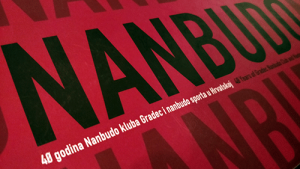 Members of INF are national nanbudo federations and organizations that aim to become national nanbudo federations. INF does not accept any individual membership. Annual membership fee is paid per national organization. National organizations are independent and fully supported by INF in their activities, and processes of recognition by NOCs or national sports federations of their respective countries. INF associates with all international martial arts sports federations and organizations that are helping development of nanbudo sport. INF is one of the founders and a regular member of SportREcognized Association, which helps recognition of sports internationally. One of the goals of INF is also the membership in GAISF (General association of international sports federations), and international recognition of nanbudo sport. Information about membership is availble by the General secretary of INF at: inf.gensec@nanbudo.org
Members of INF are national nanbudo federations and organizations that aim to become national nanbudo federations. INF does not accept any individual membership. Annual membership fee is paid per national organization. National organizations are independent and fully supported by INF in their activities, and processes of recognition by NOCs or national sports federations of their respective countries. INF associates with all international martial arts sports federations and organizations that are helping development of nanbudo sport. INF is one of the founders and a regular member of SportREcognized Association, which helps recognition of sports internationally. One of the goals of INF is also the membership in GAISF (General association of international sports federations), and international recognition of nanbudo sport. Information about membership is availble by the General secretary of INF at: inf.gensec@nanbudo.org
STATUTES OF THE INTERNATIONAL NANBUDO FEDERATION
INF
INTERNATIONAL
NANBUDO FEDERATION
STATUTES
STATUTES OF THE INTERNATIONAL NANBUDO FEDERATION
(INF)
(last changes made at GA in Dehradun, Sept. 28 2018)
I
IDENTITY OF THE INF
Article 1
In accordance with Article 60 ff of the Swiss Civil Code, an association called INTERNATIONAL NANBUDO FEDERATION (INF) is founded and established for an unlimited period of time.
Article 2
INF is a non profit association composed of national nanbudo federations, associations or organizations, and other national and international organizations that are contributing to the development of nanbudo sport and martial art internationally. INF and its members reject all forms and means of discrimination against individuals, groups of people, organisations or countries on grounds of ethnic origin, gender, language, religion or politics.
INF supports a fair representation of women in sporting activities and in the management of sport.
Article 3
The General Assembly determines the location of the headquarters of INF which is currently located in Geneva, Switzerland.
Article 4
Official language of INF is English.
II
OBJECTIVES OF THE INF
Article 5
The INF’s main objective is to promote and develop nanbudo sport and martial art internationally. The disciplines of nanbudo which develop body through physical activity, should be harmoniously complemented to the mental training that will enable athletes of better understanding nanbudo as a martial art and sport, and their everyday environment.
INF safeguards the identity of nanbudo sport and martial art internationally in order to preserve the original ideas, martial art technique and sport competition rules.
Article 6
The INF takes care of the standards of development of nanbudo sport and martial art, as well as of activities of its members, and helps them in promoting and developing at all levels nanbudo sport and martial art as well as organizing training courses for trainers, competitors and referees.
Article 7
The INF provides cooperation among its member federations, coordinates their activities, protects their interests and recognizes unconditionally the autonomy of its members and their authority within nanbudo sport and martial art.
Article 8
The INF provides information for all its members about all its activities, and particularly about international competitions and their organization.
Article 9
The INF authorizes, helps in organization or organizes itself – world, continental and international events and competitions in nanbudo sport.
III
MEMBERS
Article 10
The INF accepts these categories of members:
– regular members
– associate members
– honorary members
Article 11
Regular members of INF are only organizations officially registered as national federations or associations according to the laws of the respective country, which are associating national clubs practicing nanbudo as a martial art and competing in nanbudo sport in that country.
Regular members have the right to vote at the General Assembly.
The status of a regular member is decided by the General Assembly of INF upon proposal of the Executive Committee.
Article 12
Associate members can be other national or international organizations who contribute to the development of nanbudo martial art and sport internationally, or those who are developing in the way to become a national federation and therefore a regular member of INF.
Associate members can attend but not vote at the General Assembly.
Associate membership is decided by the General Assembly upon proposal of the Executive Committee.
Article 13
Honorary members are organizations or individuals who have had a special contribution to nanbudo development internationally. Honorary membership is decided by the Gen. Assembly upon proposal of the Executive Committee.
Article 14
If there is more than one organization who is claiming to be the official and legally registered national nanbudo federation/association in one country, General Assembly is the one to decide which one will be accepted as a member of INF.
Members can be expelled only by General Assembly for the reasons of:
– not paying membership fees or any other liabilities to INF for more than 2 years
– not respecting the Statutes or rules brought by the INF
– seriously and repeatedly damaging the image of INF or nanbudo sport and martial art
Executive Committee is deciding upon membership fees for INF members, annual licenses, budo passports, and benefits that follow different membership status and obligations.
IV
THE GOVERNING ORGANS OF THE INF
GENERAL ASSEMBLY
Article 15
The main governing organ of the INF is the General Assembly (GA).
The GA meets in principle once a year, and delegates of all paid-up regular and associate members can attend it. Regular members only have the right to vote.
Assembly is called up with a note to its members at least 30 days in advance.
Article 16
If at least 1/5 of the members submit a request for an extraordinary session of the Assembly in a written form and submit it to the President and General Secretary – an Extraordinary Assembly will be called up within 30 days with a note to members at least 20 days before the Assembly.
Article 17
The General Assembly is legally deciding if more than ½ of the regular paid-up members are present.
In the case of changing statutes or dissolution of the organization, more than 2/3 of paid-up members must be present.
Article 18
Every regular member has one vote through the delegate it delegates to General Assembly. The mandate of the delegate lasts as long as he is withdrawn from the GA by his national federation. Members of Executive Committee have also one vote each.
Article 19
Voting is always by showing hands except of voting for elections which is done by secret ballot if there is more than one candidate.
Article 20
General Assembly decides in voting by simple majority.
Article 21
General Assembly decides on the statutes and its changes and can approve different, official documents and rules, as well as it can form different committees according to its needs, who are reporting to GA once a year.
EXECUTIVE COMMITTEE
Article 22
The President, three Vice Presidents, the General Secretary, and two members of the Executive comitte (Excom) are the positions within the Excom, and are elected by General Assembly.
Article 23
Excom can appoint its members to different directing positions depending on the needs of its activities.
Article 24
The mandate of the members of Excom is 4 years, and same members can be reelected.
The mandate of a member can be shortened by Excom itself if the member does not accomplish his tasks regularly.
Article 25
The nominees must be over 18 years old and in full possession of civil rights.
Article 26
The Excom meets at least 2 times a year.
Article 27
The Excom carries out all the executive functions and tasks given to it by General Assembly.
It particularly decides on membership fees and benefits for the members.
It takes its decisions by simple majority.
It is legally deciding if at least 2 members are present.
PRESIDENT
Article 28
President is representing the INF in law and in all civil acts, and by his function he is presiding the General Assembly.
Article 29
He calls up the meetings of Excom and leads its sessions. He is signing all the administrative and financial documentation of the INF.
He is elected by the GA with a mandate of 4 years.
GENERAL SECRETARY
Article 30
General Secretary is an executive organ of the Excom, elected by General Assembly with a mandate of 4 years.
Article 31
General Secretary is a connection of the Excom to all members worldwide. He keeps an update of the members list and list of internationally registered athletes; gives out athleetes passports; keeps track and record of all the events in connection with the INF; represents INF when President is not present, and also signs all the administrative and financial documentation and gives orders for financial actions.
ACCOUNTS AUDITING COMMITTEE
Article 32
Accounts auditing committee is elected by the GA and it consists of 2 members with a mandate of 4 years.
Article 33
Accounts auditing committee meets at least once a year, and examines details of financial documents and status of INF. It gives a report to the GA about Excom report and financial documents.
V
REFEREE’S COMMITTEE
Article 34
Excom nominates Referee’s Committee of 3 members with a mandate of 4 years.
Members of the Committee can be re nominated.
Article 35
Referee’s Committee is proposing to Excom the rules for organizing competitions as well as Rules of competition itself. Committee organizes courses, examinations, licensing and delegating of international referees for international competitions in agreement with Technical director.
It reports regularly to Excom and gives report to GA once a year.
VI
GRADING COMMITTEE
Article 36
Grading Committee of 3 members is nominated by the Excom with a mandate of 4 years. Members can be re nominated. Grading committee organizes examination from 4 Dan grade up, on the international level. Examinations up to 3 Dan are organized within and under responsibility of national federations.
VII
FINANCES
Article 37
The General Assembly approves the budget within the limits of expected income based on membership fees, sponsorship and merchandizing of promotion materials (badges, books, DVDs, etc).
Article 38
The Excom is responsible for the realization and application of the budget items, during the financial year that lasts from Jan. 1st to December 31st annual.
VIII
AMENDMENTS OF STATUTES
Article 39
Proposals to amend these Statutes may be put forward by the Excom. The Excom shall call the relevant Extraordinary Assembly in compliance with the terms and procedures as set forth herein.
Article 40
Proposals to amend these Statutes must be approved by at least 2/3 (two thirds) of the members having voting rights that are present at the Assembly.
Article 41
Changes in these Statutes become provisionally effective upon approval of the Excom and finally upon ratification by the Assembly.
IX
DISSOLUTION
Article 42
The proposal to dissolve the INF must be decided by the Assembly with a majority of at least 4/5 (four-fifths) of the votes of the members having voting rights.
Article 43
If a decision on dissolution of organization is brought up at the Extraordinary Assembly called up for that reason, the remains of the property, after satisfaction of all debts or liabilities will not be distributed among the members of association but will be applied to any furtherance of any objects of the association as may be determined by the GA at the time of dissolution, or to some charitable organizations.
X
FINAL CLAUSES
Article 44
The original text of the statutes is in English. In case of any doubts for the interpretation when reading a translated version, the English text prevails and should be referred to.
Article 45
The authority of interpreting any problems arising from this Statutes, resides in the President, Excom or the General Assembly, before any final decision making.
Article 46
In the case of dispute, the Court of the seat of the INF will have jurisdiction.
This Statutes were approved by the General Assembly Aug 1st 2010
It came into force immediately. The last change was brought at GA Sept 28 2018
Arnaud Nkamhoua, President INF
Recent Posts
- INF Judges certification course, Istanbul February 3, 2026
- Anil Kumar Ram as Technical Director of Indian nanbudo federation October 19, 2025
- Morocco, Croatia and Cameroon Shine as Casablanca Hosted 7th Nanbudo World Championship October 2, 2025
- Grading Nomination for Highest Nanbudo Grades – Casablanca, 26 September 2025 October 1, 2025
- International nanbudo federation – grading exam, May 31, Zagreb May 31, 2025
Archives
- February 2026
- October 2025
- May 2025
- October 2024
- July 2024
- November 2023
- October 2023
- July 2023
- June 2023
- May 2023
- July 2022
- September 2021
- May 2021
- April 2021
- March 2021
- January 2021
- September 2020
- May 2020
- April 2020
- March 2020
- February 2020
- January 2020
- December 2019
- October 2019
- June 2019
- March 2019
- January 2019
- December 2018
- November 2018
- October 2018
- July 2018
- June 2018
- May 2018
- April 2018
- February 2018
- January 2018
- December 2017
- September 2017
- July 2017
- June 2017







